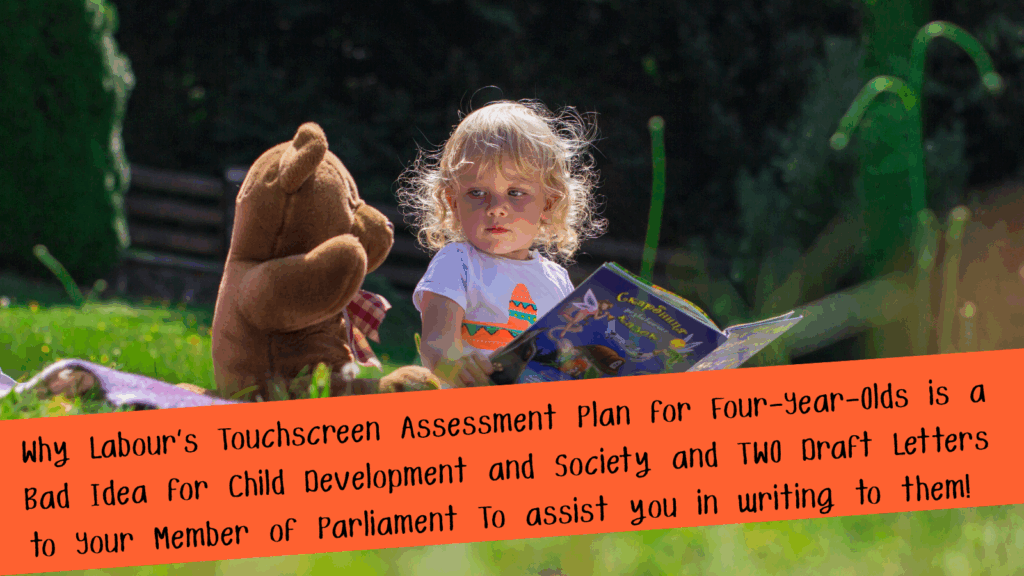
In June 2025, the UK Labour government, led by Education Secretary Bridget Phillipson, introduced new guidance requiring schools to assess reception-age pupils (as young as four) using touchscreen devices starting from the next academic term. This move has sparked significant backlash from politicians, educators, campaigners, and parents, who argue it undermines child development, parental rights, and societal well-being. Drawing on recent studies, expert opinions, and statistical evidence, this article explores why Labour’s plan to implement touchscreen-based assessments for four-year-olds is a misguided policy with potential negative consequences.
Undermining Child Development
The introduction of touchscreen assessments for four-year-olds raises serious concerns about its impact on early childhood development. Research consistently shows that excessive screen time can harm young children’s cognitive, social, and emotional growth. A 2023 study published in Paediatrics found that children exposed to screens before age five showed reduced attention spans and weaker executive functioning skills, critical for problem-solving and self-regulation. The study noted that for every additional hour of screen time per day, children exhibited a 10% increase in attention-related issues by age six.
Four-year-olds are at a crucial stage of brain development, where hands-on, sensory-rich experiences with physical objects and human interaction are essential. Critics, including Katharine Birbalsingh, Britain’s strictest headteacher, argue that replacing traditional assessments using books, toys, or verbal interaction with touchscreen devices risks normalising excessive screen use in early education. This shift could impair children’s ability to engage with the physical world and develop fine motor skills, which are better fostered through tactile activities like drawing or manipulating objects. A 2021 report from the American Academy of Paediatrics highlighted that excessive screen exposure in pre-schoolers is linked to delays in language development and reduced social skills, with 25% of children showing measurable developmental setbacks by age five when screen time exceeds two hours daily.
Moreover, the Department for Education’s (DfE) guidance implicitly endorses screen use in reception classes, potentially increasing overall screen exposure. A 2023 NHS study reported that 20% of children aged 8–16 already experience probable mental health issues, a 7% increase since 2017, partly attributed to digital overuse. Forcing four-year-olds to interact with touchscreens for formal assessments could exacerbate these trends, embedding screen dependency at an even earlier age.
Undermining Parental Rights
Labour’s policy has also been criticised for undermining parental authority. Many parents consciously limit their children’s screen time to foster healthier development, with 68% of UK parents expressing concern about excessive screen use in a 2024 Mumsnet survey. The new guidance risks overriding these preferences by mandating screen-based assessments, effectively normalising device use in schools. A letter signed by prominent figures, including Birbalsingh, Justine Roberts (Mumsnet founder), and Sophie Winkleman, sent to Phillipson and Technology Secretary Peter Kyle, argued that the policy “undermines the rights of parents to raise their children in a screen-free, or ‘screen-lite’, environment.”
This concern is particularly acute given the growing movement among parents to delay children’s exposure to digital devices. A 2022 study by the University of Cambridge found that parents who restricted screen time before age five reported a 15% improvement in their children’s emotional regulation and social interactions by age seven compared to those with unrestricted access. By imposing touchscreen assessments, the DfE disregards parental choice, potentially alienating families who prioritise alternative developmental approaches. This top-down approach aligns with broader criticisms of Labour’s education policies, which some argue treat parents as “incompetent” and shift responsibility from families to the state.
Negative Societal Implications
The societal ramifications of Labour’s plan extend beyond individual child development. By normalising screen use in early education, the policy risks entrenching a culture of digital dependency, which could have long-term consequences for mental health, education outcomes, and workplace readiness. The NHS reported in 2023 that poor mental health contributes to high school absence rates, with 20% of children missing at least one day of school every two weeks, a trend linked to increased screen time and reduced face-to-face interaction. These absences correlate with poorer academic performance and lower career prospects, with government research showing that frequently absent pupils earn £10,000 less annually by age 28 compared to peers with consistent attendance.
Furthermore, the policy could widen educational inequalities. Not all children have equal access to technology at home, and those from lower-income families may struggle with touchscreen assessments due to unfamiliarity with devices. A 2023 report from the Sutton Trust found that 30% of children from disadvantaged backgrounds lack regular access to digital devices, potentially putting them at a disadvantage in screen-based testing environments. This could exacerbate existing attainment gaps, contradicting Labour’s stated goal of improving educational equity.
The policy also diverts resources from more pressing educational needs. Schools are already grappling with tight budgets, with the Institute for Fiscal Studies warning in 2025 that rising costs (e.g., a proposed 2.8% teacher pay rise) will outstrip funding, potentially leading to cutbacks in pastoral support and curriculum options. Investing in touchscreen infrastructure for assessments may strain school budgets further, diverting funds from proven interventions like programs which have boosted reading proficiency in England since 2012.
Counterarguments and Labour’s Rationale
Supporters of the policy, including Phillipson, argue that touchscreen assessments modernise education and prepare children for a digital world. The DfE claims the tests are designed to be age-appropriate and align with Labour’s broader curriculum review, which aims to make education more relevant to contemporary needs. Proponents also suggest that digital assessments could streamline data collection, allowing teachers to focus on instruction rather than manual grading.
However, these arguments overlook the developmental inappropriateness of screens for four-year-olds and the lack of evidence that digital assessments improve educational outcomes at this age. Critics like Laura Trott, the shadow education secretary, argue that “the evidence of lasting damage to children so young is now overwhelming,” citing studies linking early screen exposure to developmental delays. The policy’s focus on digital efficiency also ignores the human element of early education, where teacher-child interactions are critical for fostering trust and engagement.
Conclusion
Labour’s plan to introduce touchscreen assessments for four-year-olds is a poorly conceived policy that risks harming child development, undermining parental rights, and exacerbating societal challenges. Research shows that early screen exposure can impair cognitive and emotional growth, while the policy’s disregard for parental preferences alienates families who prioritise screen-free environments. Societally, it could deepen digital dependency and educational inequalities, diverting resources from more effective interventions. Instead of pushing young children toward screens, policymakers should prioritise evidence-based approaches like, play-based learning, and parental engagement, that have proven benefits for early development. As critics have urged, the DfE should revoke this guidance and focus on protecting childhood, not digitising it.
Draft Letter to Your Member of Parliament Regarding Labour’s Touchscreen Reception Baseline Assessment (RBA) for Four-Year-Olds
References
- Safe Screens – Join us in campaigning to protect children from the harms of unregulated EdTech, and addictive-by-design smartphones https://safescreens.org/reception-baseline-assessment-rba/ https://safescreens.org/letter-to-mp-rba/
- Labour under fire for touchscreen assessment plans for four-year-olds, The Telegraph, 2025-06-14. https://www.telegraph.co.uk/politics/2025/06/14/labour-bridget-phillipson-four-year-olds-devices-testing/ https://archive.ph/rkVZA#selection-3233.0-3235.112
- Labour accused of ‘educational vandalism’ with plan to strip academies of their freedoms, The Telegraph, 2025-01-08. https://www.telegraph.co.uk/news/2025/01/08/labour-educational-vandalism-academies-bill-phillipson/
- American Academy of Pediatrics, 2021 Report on Screen Time and Child Development. https://www.apa.org/monitor/2020/04/cover-kids-screens#:~:text=Amid%20this%20rapid%20change%2C%20professional,%E2%80%9CGrand%20Theft%20Auto%20V.%E2%80%9D
- NHS, 2023 Mental Health of Children and Young People in England. https://digital.nhs.uk/data-and-information/publications/statistical/mental-health-of-children-and-young-people-in-england/2023-wave-4-follow-up
- Sutton Trust, 2023 Report on Digital Access and Educational Inequality.https://www.suttontrust.com/wp-content/uploads/2023/08/stories-from-the-class-of-2023-.pdf
- University of Cambridge, 2022 Study on Screen Time and Emotional Regulation. https://www.cambridge.org/core/journals/psychological-medicine/article/screen-time-brain-network-development-and-socioemotional-competence-in-childhood-moderation-of-associations-by-parentchild-reading/D78E5BD54628940B752E35F609BA1FB4
- Mumsnet, 2024 Survey on Parental Attitudes Toward Screen Time. https://ygam.org/news/new-mumsnet-survey-reveals-parents-call-for-education-on-video-gaming-in-schools/#:~:text=London%2C%2017%20July%202024:%20Parents,to%20sexual%20imagery%20or%20content.
- “Parents are desperate for government support against the might of Big Tech” – Mumsnet demands action on kids and social media as new research lays bare the level of children’s addiction to their devices. https://www.mumsnet.com/news/children-addicted-social-media
- Labour wants the state to raise our children, The Telegraph, 2025-02-13. https://www.telegraph.co.uk/news/2025/02/13/labour-phillipson-education-parents-child-outcomes/
- Children to be taught to show some ‘grit’, The Telegraph, 2025-05-16. https://www.telegraph.co.uk/politics/2025/05/16/children-to-be-taught-to-show-some-grit/
- Labour to make national curriculum more ‘diverse’, The Telegraph, 2024-12-29. https://www.telegraph.co.uk/politics/2024/12/29/labour-national-curriculum-diversity-bridget-phillipson/
